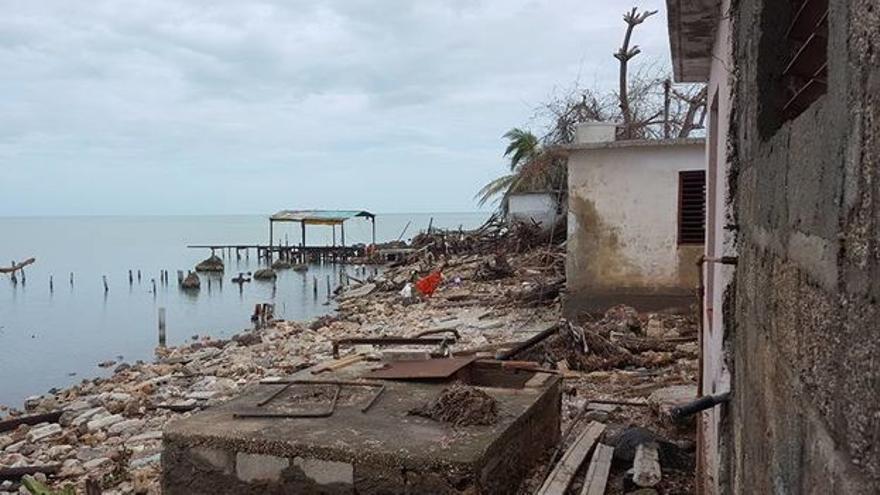
![]() 14ymedio, Havana, 30 March 2018 — “They sunk us by throwing an anchor against the boat,” recalls Denys Díaz Crespo, a 22-year-old rafter who, together with 15 other young people, sailed from Punta Alegre, in Ciego de Ávila, Cuba, on March 17. The group was heading to the United States but the Cuban border guards violently prevented it, according to what Díaz told 14ymedio.
14ymedio, Havana, 30 March 2018 — “They sunk us by throwing an anchor against the boat,” recalls Denys Díaz Crespo, a 22-year-old rafter who, together with 15 other young people, sailed from Punta Alegre, in Ciego de Ávila, Cuba, on March 17. The group was heading to the United States but the Cuban border guards violently prevented it, according to what Díaz told 14ymedio.
“It was a nightmare,” says Díaz, who planned the trip with his friends, despite the fact that more than a year ago Barack Obama ended the wet foot/dry foot policy that allowed Cubans who reached American soil to stay and eventually become citizens. The group was confident that it would still be possible to find some way to “legalize their status” in the United States.
“We made the boat ourselves, we had enough water and food. Nothing we carried was stolen,” the young man insists, to counter frequent police accusations about the theft of state property in clandestine departures.
After getting some distance from the coast they were approached by “a small boat” from the Cuban Border Forces. The Coast Guard demanded that they surrender or return to the island. “We said no, because they were going to fine us and we were sure we would also lose our jobs, so we continued.”
The small Coast Guard boat left, but when they were a mile from international waters, a larger boat arrived, a Russian-built Griffin. “They started throwing a grampín at us, which is an anchor with more sharp tips,” Díaz says. “They threw it against the raft which broke in several places.”
With the anchor they also broke the stick that held the sail and the impacts caused three of the young people to fall into the water. The border guards shouted the whole time “surrender because otherwise we are going to split the raft in half,” added young man from Ciego de Avila.
When the raft was just scattered pieces floating in the sea, the officers told the young people that they had to swim to the Griffin to be rescued. They never threw life preservers or helped the rafters to climb into the ship, says Díaz.
When they arrived on land, they were held for a few hours in the city of Morón and the police imposed a fine of 4,000 Cuban pesos (more than 6 month’s average wages) on 15 of the group’s members, while the remaining rafter was fined 5,000 Cuban pesos for “protesting against the border guards when the raft was sinking.”
Díaz says that when he returned to his job as a custodian in a state-owned company, he was informed that he had been fired and since then he has not been able to find a job, a situation that he blames the stigma of having left the country illegally.
“We wanted to leave to make our lives better and because there are so many problems here, and there is no way to earn money,” explains the young man. Their dream of emigrating had been gorwing since last September when Punta Alegre was devastated by Hurricane Irma and living conditions for the residents worsened.
Maria de Los Angeles Garcia Leon, who is a resident of the town, says that violent actions by the border guards are common when they detect a group that wants to leave the country in a raft. “It’s a crime, they do everything to drown them alive.”
Reports of excessive violence by this arm of the State against illegal emigrants are frequent. The most dramatic case occurred in 1994, when the 13 de Marzo tugboat was sunk in the bay of Havana by the action of the security forces, killing 41 of the passengers including many children.
The Government has always denied its responsibility in the sinking of that tugboat in which entire families were traveling trying to flee the Island.
Rafters intercepted by the US Coast Guard are returned to the island. Some 58 Cuban immigrants have tried to enter the US illegally by sea since October 1, which contrasts sharply with the same period last year when 1,934 Cubans were detained by the American authorities.
_____________________________
The 14ymedio team is committed to serious journalism that reflects the reality of deep Cuba. Thank you for joining us on this long road. We invite you to continue supporting us, but this time by becoming a member of 14ymedio. Together we can continue to transform journalism in Cuba.
